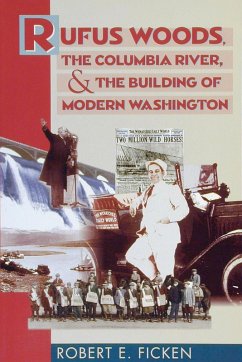Rufus Woods, editor and publisher of the Wenatchee Daily World for more than forty years, has been called the "High Priest of the Columbia River." From his editorial platform, Woods tirelessly promoted Wenatchee and north central Washington and advocated for Columbia River development. He pegged his brightest hopes on a huge dam to be built in the isolated Grand Coulee region.
A founding member of the "Dam University," Woods--through the World--helped to keep the drive for the structure alive. From 1918 through Grand Coulee's completion in 1941, he was the leading promoter of the largest dam-building project in American history.
Utilizing his newspaper and his extensive political contacts at state and national levels, Woods helped convince President Franklin Roosevelt, Congress, and the Bureau of Reclamation that the grandiose scheme was attainable. Where others despaired, he never faltered. Speaking before the 1942 Grand Coulee High School graduating class, Woods proudly boasted of the accomplishment that he helped see to reality.
"So here it stands, a monument to the idea and the power of an idea; a monument to an organization; a monument to cooperation. You, class of 1942, could you come back here in a thousand years hence, you would hear the sojourners talking as they behold this 'slab of concrete,' and you would hear them say, 'Here in 1942, indeed, there once lived a great people.'"
Woods got his dam, but not the Wenatchee boom he desired. Possible only because of federal financing, those in control imposed a vast maze of power lines emanating from the dam's huge hydroelectric plant. Cities like Portland and Seattle benefited from its power much more than Wenatchee. Even so, Woods's beloved adopted home grew tremendously during his lifetime, and much of that economic development can be attributed to his single-minded efforts.
Hinweis: Dieser Artikel kann nur an eine deutsche Lieferadresse ausgeliefert werden.
A founding member of the "Dam University," Woods--through the World--helped to keep the drive for the structure alive. From 1918 through Grand Coulee's completion in 1941, he was the leading promoter of the largest dam-building project in American history.
Utilizing his newspaper and his extensive political contacts at state and national levels, Woods helped convince President Franklin Roosevelt, Congress, and the Bureau of Reclamation that the grandiose scheme was attainable. Where others despaired, he never faltered. Speaking before the 1942 Grand Coulee High School graduating class, Woods proudly boasted of the accomplishment that he helped see to reality.
"So here it stands, a monument to the idea and the power of an idea; a monument to an organization; a monument to cooperation. You, class of 1942, could you come back here in a thousand years hence, you would hear the sojourners talking as they behold this 'slab of concrete,' and you would hear them say, 'Here in 1942, indeed, there once lived a great people.'"
Woods got his dam, but not the Wenatchee boom he desired. Possible only because of federal financing, those in control imposed a vast maze of power lines emanating from the dam's huge hydroelectric plant. Cities like Portland and Seattle benefited from its power much more than Wenatchee. Even so, Woods's beloved adopted home grew tremendously during his lifetime, and much of that economic development can be attributed to his single-minded efforts.
Dieser Download kann aus rechtlichen Gründen nur mit Rechnungsadresse in A, D ausgeliefert werden.
Hinweis: Dieser Artikel kann nur an eine deutsche Lieferadresse ausgeliefert werden.









